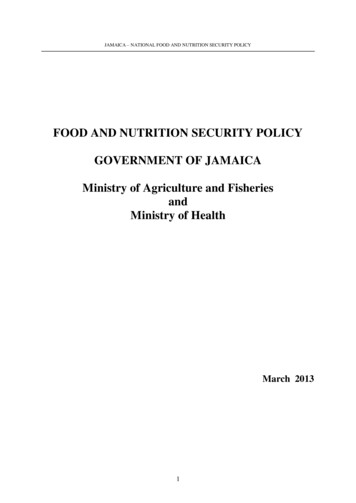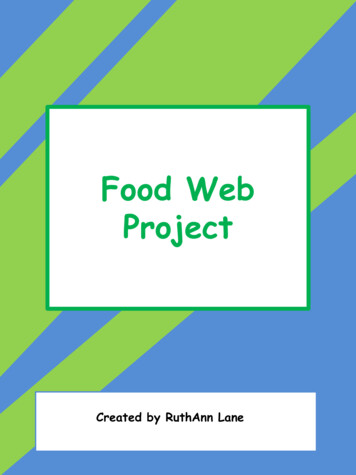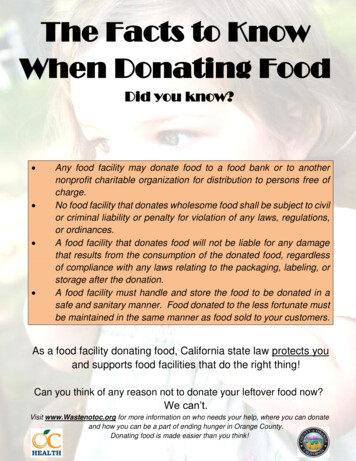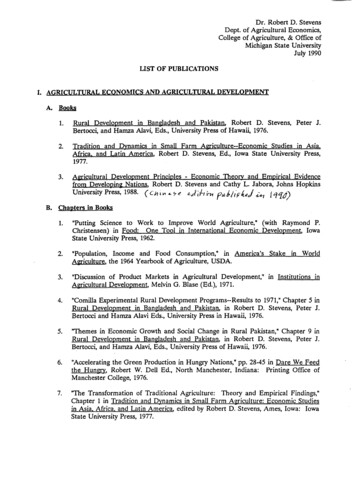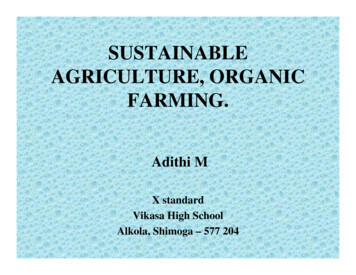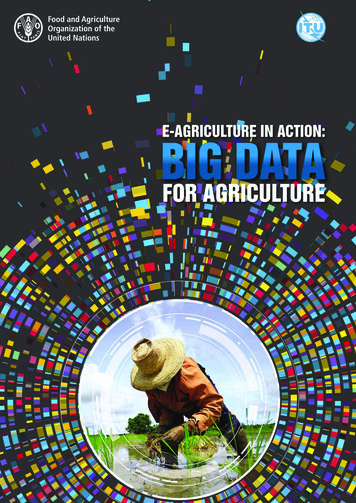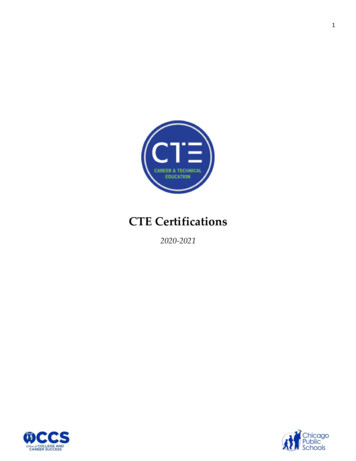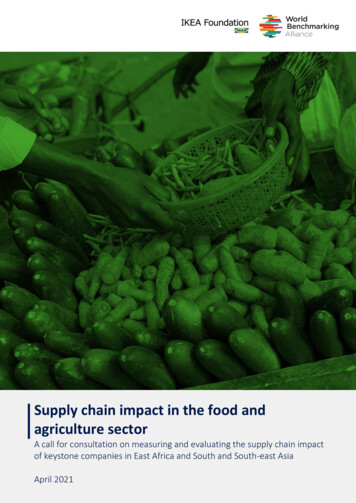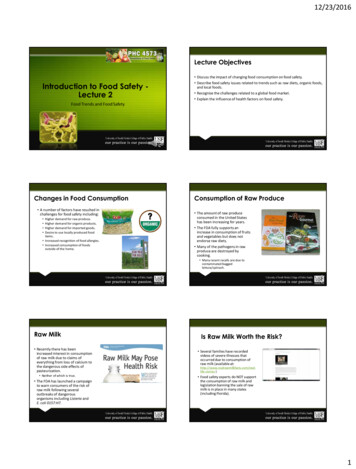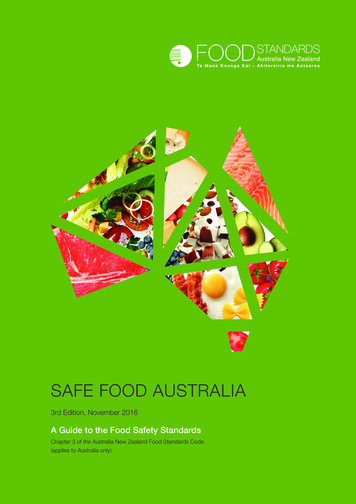
Transcription
SYLLABUS11:020:210 Spring17INTRODUCTION TO AGRICULTURE AND FOOD SYSTEMS (Fall 2016)11:020:210Updated 1/20/2017COURSE SECTIONS:Introduction to Agriculture and Food SystemsMeeting time: Monday 10:55 am – 12:15 pmClassroom: Institute for Food, Nutrition and Health (IFNH), Room 205, 61 Dudley Rd, Cook CampusClass length: 14 week class: Monday – December 13, 2016Class credit/format/grading: 3 Credit; Hybrid Format; Graded A-F.CONTACT INFORMATION:Xenia K. Morin, Ph.D.IFNH, 61 Dudley, Suite 220xenia.morin@rutgers.edu(848) 932-3502Office hours: Tuesday 1-2 pm, or by appointmentCOURSE TEXTS, WEBSITE, RESOURCES AND MATERIALS:Textbooks:1. Neff, Roni (ed.) Introduction to the U.S. Food System: Public Health, Environment and Equity. JosseyBass, San Francisco, 2015. ISBN: 978-1-118-06338-5 (paperback).2. Belasco, Warren. Food: the key concepts. Berg, New York, 2008. ISBN 978-1-84520-673-4 (paper).3. Carlisle, Liz. Lentil Underground. Avery, New York, 2015. ISBN 978-1-592-40956-3 (paper).Textbooks are available at the Campus Barnes & Noble Bookstore and are also on course reserves in theChange Library in Foran Hall. Belasco is also available on Google Play.Additional materials and readings will be posted on Sakai. (sakai.rutgers.edu), under course “INTRO TO AGAND FOOD SY Sp16”. Your NetID and password are required to log into Sakai.COURSE DESCRIPTION:This introductory survey course investigates and analyzes agriculture and food systems in the context of publichealth, the environment and social justice. We primarily focus on the American food systems but will exploresome global and food systems as well. The environmental, economic, biological, cultural, social and ethicaldimension of our food systems—from farm to fork—are considered. We look critically at some of thechallenges faced through the food systems in order to feed a growing world population, anticipated in exceeding9 billion people by 2050. These challenges include risks from weather events, soil degradation and watershortages, pest and disease pressure, dwindling diversity of genetic resources, increasing energy demands aswell as navigating controversies over adopting technologies and balancing the triple-bottom line, social justiceand ethical considerations. We will consider whether, and how, farming can be done in an environmentallyfriendly and sustainable way, and consider whether consumers can play a role through the food choices theymake. The hybrid format of this course provides extended opportunities for students to develop their onlinewriting skills as well as develop their ability to work well with others in an online environment. Class time isdedicated to short presentations, discussion and small group work.1
SYLLABUS11:020:210 Spring17LEARNING GOALS:By the end of the class, students will:1. Express his/her opinions, research findings and arguments via written and oralcommunication.2. Increase his/her knowl edge of agricultural practices and food systems issues which requiresdeveloping the appropriate vocabulary, gaining knowledge of the field, applying analyticalframeworks, computational analysis and systems thinking.3. Start to connect agricultural and food systems practices to environmental, economic andhuman health impacts as well as social justice and ethical issues.4. Describe at least one change in culture, economics, policy or technology that has impactedagriculture, food systems, public health, social justice and/or the environment.5. Research a topic of his/her choice in the area agriculture/food systems using assignedreadings, library-based research skills and online resources. The student will learn to focushis/her research topics and write with academic integrity. The student will complete aresearch paper.ASSIGNMENTS, RESPONSIBILITIES & ASSESSMENT:Assignments:All written assignments are listed in the schedule of classes in bold. Submission of written assignments is viaSakai.Responsibility and the Principle of Charity:Students are responsible for monitoring Sakai and their emails, and for completing their work with academicintegrity (see below). Students are expected to operating by the principle of charity in the class (see below).Student are responsible for keeping track of deadlines and for submitting their work on time.Assessment:Grades will be posted in the Sakai gradebook*. The grade (100% 1000 points) is determine byperformance and effort on the following:30 % (300 points) TWO Exams, each worth 15% (online; due by Sat 2/25 or 4/1)32 % (320 points) Forums – short writing assignments (complete 8 @ 20 points each)5%(50 points)Research Proposal -short writing assignment and annotated bibliography8 % (80 points)Student presentation, in class (April 24 or May 1)20% (250 points) Research paper (in lieu of final exam), due by Sat, 5/e 9 pm to Sakai).5 % (50 points)End-of-semester reflection, due by Monday, May 8, 9 am.*Your grades in this course will be assigned as follows:A (90-100)– Outstanding –The student has demonstrated a high level of consistent effort and a superior grasp of the subject matter.The student communicates ideas and concepts in an organized, insightful and analytical manner. The research work is strong and thearguments presented are focused, on-topic and based on evidence with interpretation. The student has found his/her own voice.B /B (80-89) – Very Good/Good – The student has demonstrated consistent effort and a solid grasp of the material. The B studentdemonstrates the ability to organize and examine the material in a critical and insightful manner. The B student may struggle withsome organization and analysis but has learned to use evidence; his/her voice is developing.2
SYLLABUS11:020:210 Spring17C /C (70-79) – Satisfactory/Acceptable –The student has shown a moderate or inconsistent level of effort and has demonstrated theability to grasp concepts and communicate ideas and concepts. The student’s work is basically satisfactory or acceptable, but is not inany way exceptional or insightful. The research work may be somewhat unfocused and the work may demonstrates some struggles toorganize and use evidence to support an argument. The student is struggling to find his/her voice.D (60-69)– Unacceptable – The students has demonstrated a minimal effort and understanding of the fundamental nature of the coursematerial. The student’s performance reflects inconsistent effort and the student’s research work reflects a poor understanding of theeffort and work required, or reflects a poor understanding of the overall research topic. The student struggles to articulate his/her ownopinions or research.F ( 60)– Failure – The student has demonstrated limited effort and a lack of understanding or familiarity with course concepts andmaterials. The student’s performance has been inadequate or highly inconsistent. Research work fails to follow the instructions.Failure is often the result of limited effort and poor attendance which may indicate that the student is not in the proper field of study.COURSE SCHEDULE Spring 2017 (subject to adjustment during the semester). Graded work is in BOLD:Week ClassDateREAD BeforeClassBooks referred toby author.No readings thisweek.11/2321/30Neff: Ch Intro,1, 3Belasco Ch 1.32/6Neff: Ch 2,4,15Belasco Ch 2TopicsHybrid: 80 min work to becompleted on your own afterMonday’s class.Forum postings must be posted toSakai by Monday, 9 amIntroductions; Syllabus; Lesson 1: See SakaiWhat is agriculture, and Virtual field trip: Documentary.what is a food system? Botany of Desire: The Apple byWhy do we eat what we Michael Pollan. (PBS clip 11:28eat?min;http://www.pbs.org/video/1283863020/ ).Forum 1: Prompts, see Sakai.Introduce yourself.Food systems thinking; Lesson 2: see Sakaifood triangleRead/skim Belasco: Ch 1,2framework; ecologicalVirtual field trip: “How I fell in lovethreats; agribusiness.with a Fish” by Dan Barber (19 min;Ecological and healthhttps://www.ted.com/talks/dan barbframework. What iser how i fell in love with a fishsustainability? On land; ).in the oceans. FeedingForum 2: Prompts, see Sakai.the world.Food system, publicLesson 3: see Sakaihealth, disease, obesity; Virtual field trip: ShortU.S. eating patterns and documentary. “Generation at Risk”food waste.http://generationatrisk.rutgers.edu/FOOD and WASTE DIARYForum 3: Prompts on Documentaryand on your Food and Waste Diary,see Sakai.3
SYLLABUS11:020:210 Spring1742/13Neff: Ch 5,6Belasco Ch 352/20Review Weeks 1-3Neff Ch 1-6:Belasco Ch 1-3Lessons 1-4.Neff: Ch 7,8Belasco: Ch 4,56789102/273/63/203/274/3Neff: Ch 9, 10, 11Start reading:Carlisle’s LentilUnderground, Ch 1.Food Diary Discussion.Household andCommunity foodsecurity;Class Review anddiscussion. How totake the test online.Drivers of the foodsystem: economics andpolicies; FuturesMarkets. Other drivers:convenience, identityand responsibility.Drivers of the foodsystem: food, cultureand society; food andgender; food marketing;food environments andchanging eatingpatterns; cropproductionIntroduction to LentilUnderground.SPRING BREAK (3/11-3/19)Carlisle’s LentilCrop production; StartUnderground.Animal food production;food safety; ethics andresponsibility.Class discussion ofLentil UndergroundCh 12,Review:Weeks 6-8;Neff Ch 7-12Belasco Ch 4-5Lentil UndergroundNeff: Ch 13,14Belasco 6Continue Animal FoodProduction.Documentarydiscussions.Lesson 4: see SakaiWrite up your exam review notes.No forum this week. STUDY!EXAM 1 (online): Download fromAssignment. Due : Sat. 2/ 25, 9 pm.No forum this week.Lesson 6: see SakaiIntroduction to SWAT AnalysisVirtual field trip: TBD.Forum 4: Prompts, see Sakai.Lesson 7: see SakaiView video for Lentil Undergroundand take a look at the website.Forum 5: Prompts, see Sakai.Lesson 8: see SakaiVirtual field trip:PBS Frontline Documentary “TheTrouble with Chicken.Forum 6: Critique of documentary.Prompts, see Sakai.EXAM 2 (online): Download fromAssignment. Due : Sat. 4/1, 9 pm.No forum this week.Food processing,Lesson 10: Finding a research topicpackaging andand finding resources.distribution.Connecting farm to fork. No Virtual field trip this week.Perform library research.4
SYLLABUS11:020:210 Spring17Learning about Librarybased Research inAgriculture and FoodSystems.ASSIGNMENT (DROP BOX):Research Proposal: AnnotatedBibliography. Prompts, see Sakai.Due 4/10 9 amResearch Proposaldiscussion114/10Neff: Ch 14, 15Discussion on yourresearch plan. What’snext? Moving Forwardwith research.Lesson 11: ResearchForum 7: Prompts, see Sakai.Neff: Changing farmingpractices and eatingpatterns. Social justice.Future of Food124/17Neff Ch 16,Work on yourresearch for yourpaper andpresentation.Writing a researchpaper; preparing apresentation. Selectingwho presents in whichweek.If time & weatherallows, Trip to Rutgersfarm.134/24145/1LASTDAY ofCLASSSAT. May6, 9:00 pmMON.May 8, 9AMWork on yourresearch for yourpaper andpresentation.Work on yourresearch for yourpaper.Student Presentationsin classWork on yourresearch paper.Research PaperStudent Presentationsin classEnd-of-SemesterReflection5Lesson 12: Using evidence andfinding an argument. Citations.Work on your research and studentpresentations. Students will reportin week 13 and 14 on their researchto date and their emergingargument for their paper.Guidelines will be provided.Forum 8: Write about some thingyou have learned this week whileresearching or visiting the farm.Work on your research paper and/orstudent presentations.Forum 9: What you learned fromthe talks this week.Work on your research paper and/orstudent presentations.Forum 10: What you learned fromthe talks this week.Congratulations on completing thecourse!
SYLLABUS11:020:210 Spring17(*NOTE: Guest lecturer: TBD)FINAL EXAM/PAPER DATE AND TIME:THERE IS NO FINAL EXAM. YOUR RESEACH PAPER IS DUE BY SATURDAY, MAY 6, 9:00 PM.SUBMIT VIA SAKAI ASSIGNMENTS.POLICIES and IMPORTANT INFORMATION:Note: All information in this syllabus and course schedule is subject to change. Any changes to the syllabus or schedulewill be announced in the scheduled lecture periods and posted to Sakai. It is the student’s responsibility to stay informed.LATE POLICY:1. Class. Students are expected to be ready to start class on time. Students who are later than 5 min will beconsidered late. Three late arrivals is the equivalent to one unexcused absence and may impact his/her grade.2. Student work. Student written work (forum; research paper) have assigned due dates and times. Latesubmission of the research paper will be assessed a grade penalty of 10% per day (eg. 10/100 points per day)unless there is an excused absence (documented illness or family emergency). Forums will be given half-creditfor one day late and no credit for two days late except in the case of documented illness, familyemergencies, or previously arranged extensions for religious reasons. In the case of an excused absence, theinstructor will set a new deadline. Student presentations will only be made up outside of class in case of anexcused absence.3. Exams cannot be made up unless there is an excused absence.ACCOMODATIONS FOR STUDENTS WITH DISABILITIES:Please follow the procedures outlined at . Full policies andprocedures are at https://ods.rutgers.edu/ABSENCE POLICY:Students are expected to attend all class and attendance will be taken at every class. Missing class will meanyou will miss material that cannot be made up. However, if you are sick, this will count as an excused absence.If you will be absent from a class for any reason, please report your absence through the University AbsenceReporting Website https://sims.rutgers.edu/ssra/. An email is automatically sent to me. The University alsorecommends that you also contact your instructor directly to let him/her know of your absence. NOTE: Morethan 2 unexcused absences other than per Rutgers guidelines (religious observance, participation inRutgers-approved activities) may result in failing the course.ACADEMIC INTEGRITY: HTTP://ACADEMICINTEGRITY.RUTGERS.EDU/The university's policy on Academic Integrity is available at rity-policy. The principles of academic integrity require that a student: properly acknowledge and cite all use of the ideas, results, or words of others.6
SYLLABUS11:020:210 Spring17 properly acknowledge all contributors to a given piece of work.make sure that all work submitted as his or her own in a course or other academic activity is producedwithout the aid of impermissible materials or impermissible collaboration. obtain all data or results by ethical means and report them accurately without suppressing any resultsinconsistent with his or her interpretation or conclusions. treat all other students in an ethical manner, respecting their integrity and right to pursue theireducational goals without interference. This requires that a student neither facilitate academic dishonestyby others nor obstruct their academic progress. uphold the canons of the ethical or professional code of the profession for which he or she is preparing.Adherence to these principles is necessary in order to ensure that everyone is given proper credit for his or her ideas, words, results, and other scholarly accomplishments. all student work is fairly evaluated and no student has an inappropriate advantage over others. the academic and ethical development of all students is fostered. the reputation of the University for integrity in its teaching, research, and scholarship is maintained andenhanced.Failure to uphold these principles of academic integrity threatens both the reputation of the University and thevalue of the degrees awarded to its students. Every member of the University community therefore bears aresponsibility for ensuring that the highest standards of academic integrity are upheld.STUDENT WELLNESS rs.edu/do-something-to-help-share-a-concern/For emergencies or crimes in progress, call 9-1-1.Rutgers is a community that cares. We DO SOMETHING when we are concerned about one of our communitymembers. We understand that there are times when a student’s journey of learning and growth may have somerough points along the way. These rough points may be personal, emotional, psychological, academic,substance use or other challenges that may interfere with the ability to succeed and thrive at the university.There are times when people may observe a behavior and feel concerned. These concerns may be part of alarger story for a student facing challenges. Thus, it is important to Do Something and share your concerns sothat the student can get assistance as soon as possible before the issues grow too large.Just In Case Web App Just In CaseAccess helpful mental health information and resources for yourself or a friend in a mental health crisis on yoursmartphone or tablet and easily contact CAPS or RUPD.Counseling, ADAP & Psychiatric Services (CAPS)(848) 932-7884 / 17 Senior Street, New Brunswick, NJ 08901/ www.rhscaps.rutgers.edu/CAPS is a University mental health support service that includes counseling, alcohol and other drug assistance,and psychiatric services staffed by a team of professional within Rutgers Health services to support students’efforts to succeed at Rutgers University. CAPS offers a variety of services that include: individual therapy,group therapy and workshops, crisis intervention, referral to specialists in the community and consultation andcollaboration with campus partners.Violence Prevention & Victim Assistance (VPVA)7
SYLLABUS11:020:210 Spring17(848) 932-1181 / 3 Bartlett Street, New Brunswick, NJ 08901 / www.vpva.rutgers.edu/The Office for Violence Prevention and Victim Assistance provides confidential crisis intervention, counselingand advocacy for victims of sexual and relationship violence and stalking to students, staff and faculty. Toreach staff during office hours when the university is open or to reach an advocate after hours, call 848-9321181.Disability Services(848) 445-6800 / Lucy Stone Hall, Suite A145, Livingston Campus, 54 Joyce Kilmer Avenue, Piscataway, NJ08854 / https://ods.rutgers.edu/Rutgers University welcomes students with disabilities into all of the University's educational programs. Inorder to receive consideration for reasonable accommodations, a student with a disability must contact theappropriate disability services office at the campus where you are officially enrolled, participate in an intakeinterview, and provide documentation: delines. If thedocumentation supports your request for reasonable accommodations, your campus’s disability services officewill provide you with a Letter of Accommodations. Please share this letter with your instructors and discuss theaccommodations with them as early in your courses as possible. To begin this process, please complete theRegistration form on the ODS web site at: .Scarlet Listeners(732) 247-5555 / http://www.scarletlisteners.com/Free and confidential peer counseling and referral hotline, providing a comforting and supportive safe space.8
INTRODUCTION TO AGRICULTURE AND FOOD SYSTEMS (Fall 2016) 11:020:210 Updated 1/20/2017 COURSE SECTIONS: Introduction to Agriculture and Food Systems Meeting time: Monday 10:55 am - 12:15 pm Classroom: Institute for Food, Nutrition and Health (IFNH), Room 205, 61 Dudley Rd, Cook Campus Class length: 14 week class: Monday - December 13, 2016
